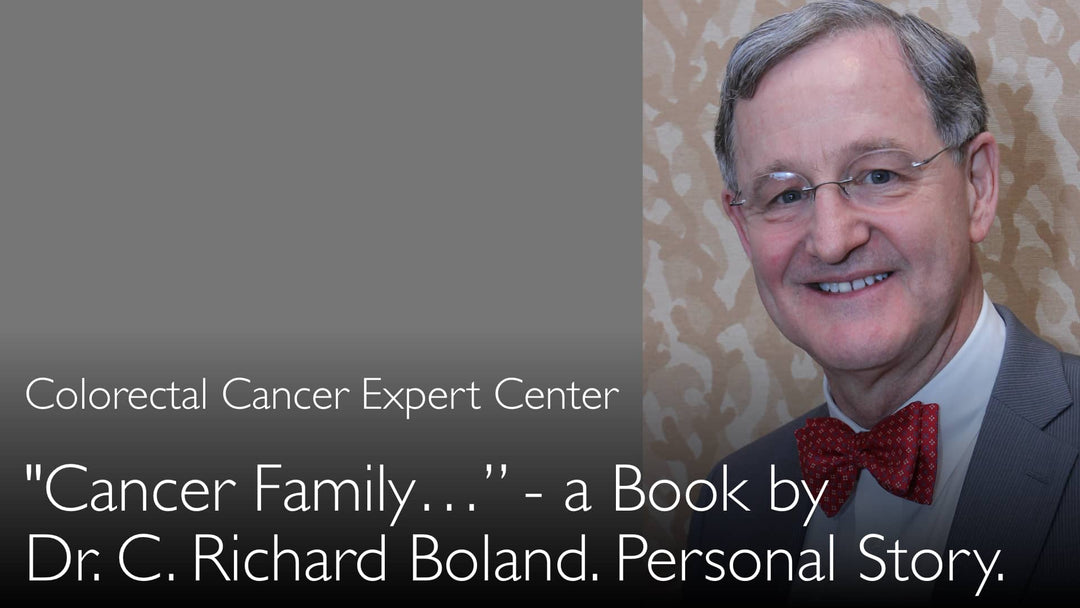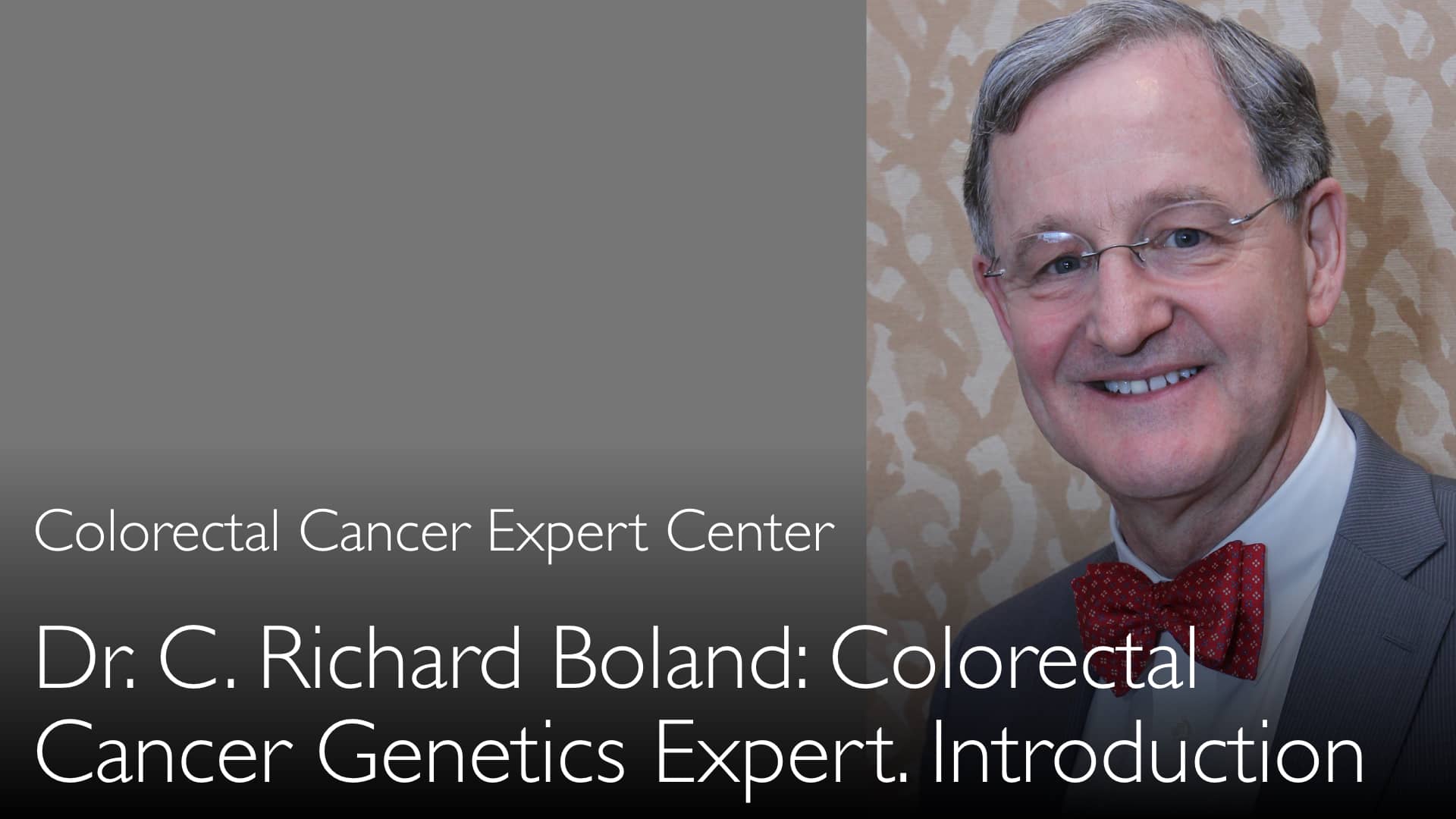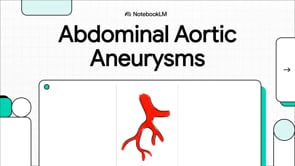Dr. C. Richard Boland, MD, a leading expert in gastroenterology and hereditary colorectal cancer, shares his personal journey of uncovering the genetic cause of Lynch syndrome in his family. His book recounts how early-onset colon and uterine cancer across generations led to groundbreaking discoveries in cancer genetics, ultimately saving lives through targeted screening and preventive strategies.
Arvelig tyktarmskræft forstået: En families genetiske rejse
Spring til afsnit
- Familiekræftarv tænder lægekarriere
- Lynch-syndromets opdagelse gennem personlig tragedie
- Genetisk forskningsgennembrud i tyktarmskræft
- Hvordan genetisk screening redder liv
- Når videnskab møder familiehistorie
- Håb for fremtidige generationer
- Fuld transskription
Familiekræftarv tænder lægekarriere
Dr. C. Richard Boland, MD, begyndte sin rejse ind i kræftgenetikken efter sin fars død af tyktarmskræft i 1969. Som medicinstuderende på første år opdagede han et foruroligende mønster: 10 af hans fars 13 søskende udviklede kræft, ofte i 20'erne eller 30'erne. Familien havde flere tilfælde af tidlig debuterende tyktarmskræft og livmoderkræft, hvilket pegede på en stærk arvelig komponent.
Dr. Boland indsamlede omhyggeligt journaler og familieoplysninger og fandt ud af, at hans far havde udviklet tyktarmskræft i en alder af blot 25 år. Denne personlige forbindelse til arvelig kræft skulle komme til at præge hele hans karriere inden for gastroenterologi og kræftforskning.
Lynch-syndromets opdagelse gennem personlig tragedie
Familens kræftmønster svarede til det, Dr. Henry Lynch havde beskrevet i den medicinske litteratur – hvad vi i dag kalder Lynch-syndrom eller arvelig nonpolyposis tyktarmskræft (HNPCC). Dr. Boland tog kontakt til Dr. Lynch, som delte værdifulde familiestamtalsdata, der viste sammenhænge mellem tyktarmskræft, livmoderkræft, æggestokkræft, brystkræft, bugspytkirtelkræft og melanoma.
Dr. Boland indså, at hans familie bar på denne genetiske disposition, hvilket forklarede, hvorfor så mange slægtninge udviklede kræft i unge år. Opdagelsen af mikrosatellitinstabilitet i 1993 leverede det første biomærke for disse arvelige kræftformer.
Genetisk forskningsgennembrud i tyktarmskræft
Sammen med Dr. Bert Vogelstein arbejdede Dr. Boland på at identificere den specifikke genmutation, der påvirkede hans familie. Ved hjælp af blodprøver fra en ramt kusine anvendte de avancerede genjagteknikker for at isolere mutationen, der var ansvarlig for Lynch-syndrom i familien.
Gennembruddet kom, da de med succes klonede mutationen, hvilket muliggjorde præcis genetisk testning for familiemedlemmer. Denne opdagelse viste, at 50 % af Dr. Bolands slægtninge bar den kræftfremkaldende genvariant, mens den anden halvdel kunne undgå unødvendig intensiv screening.
Hvordan genetisk screening redder liv
Med den genetiske mutation identificeret kunne Dr. Bolands familie indføre målrettede forebyggelsesstrategier. Familiemedlemmer med Lynch-syndrom gennemgår nu regelmæssige koloskopier, mens kvinder vælger profylaktisk fjernelse af livmoder og æggestokke for at forebygge livmoder- og æggestokkræft.
Effekten har været betydelig: ethvert familiemedlem med mutationen, der følger screeningsprotokoller, er i live den dag i dag. Dette står i skarp kontrast til tidligere generationer, hvor tidlige kræftdødsfald var almindelige.
Når videnskab møder familiehistorie
Dr. Bolands bog forbinder medicinsk videnskab med personlig fortælling og gør komplekse genetiske begreber tilgængelige. Han beskriver, hvordan familiens succes inden for forskellige fag maskerede deres genetiske sårbarhed og skabte, hvad han kalder "en frygtelig hemmelighed, som ingen ønskede at drøfte."
Historien fremhæver, hvordan personlig motivation kan drive videnskabelig opdagelse, hvor Dr. Bolands beslutsomhed om at beskytte sin familie førte til gennembrud, der gavner utallige andre med arvelige kræftsyndromer.
Håb for fremtidige generationer
Dr. C. Richard Boland, MD, understreger den håbefulde besked i sin forskning: genetisk viden styrker forebyggelsen. Selvom 50 % af hans familie bærer Lynch-syndrom-mutationen, har de nu værktøjerne til at opdage og forebygge kræft tidligt.
Bogen fungerer både som en medicinsk detektivfortælling og et vidnesbyrd om, hvordan videnskabelig opdagelse kan forbedre familiehelbredsresultater. Dr. Bolands arbejde viser, at forståelse af arvelige kræftrisici kan bryde cyklusser af tidlige kræftdødsfald i berørte familier.
Fuld transskription
Dr. C. Boland, MD: Dr. C. Richard Boland er en førende gastroenterolog og tyktarmskræftexpert i USA. Han har skrevet en bog om sin egen familie med titlen "Cancer Family: The Search for the Cause of Hereditary Colorectal Cancer." Bogen handler om Dr. Bolands families kamp med tyktarmskræft og livmoderkræft. Hans personlige familiestrid med tyktarmskræft hjalp ham med at opdage et gen, der øger risikoen for tyktarmskræft.
Dr. Anton Titov, MD: Dr. C. Richard Boland, MD, De har for nylig udgivet en fascinerende og dybsindig bog, "Cancer Family: The Search for the Cause of Hereditary Colorectal Cancer." Dette er en indsigtsfuld bog om Deres egen families kamp med arvelig tyktarmskræft gennem mange generationer og tilfælde af livmoderkræft på den kvindelige side af Deres familie. Vil De fortælle os om Deres bog? Dette er en historie, De har skrevet på en meget interessant måde. Denne historie satte Dem på en fantastisk karrierevej inden for biomedicinsk opdagelse med praktiske implikationer for den nuværende generation af Deres egen familie.
Dr. C. Boland, MD: Ja! Da jeg var førsteårs medicinstuderende i september 1969, fik min far mavesmerter i november. For at gøre en lang historie kort, han havde tyktarmskræft og døde inden næste sommer. Mens han gennemgik sin sygdom, diskuterede vi hans situation mere. Det viste sig, at der var en omfattende historie om familiær tyktarmskræft i vores familie, som ikke var blevet drøftet.
Jeg havde hørt lidt om det – jeg vidste, at flere mennesker i hans familie var døde af tyktarmskræft. Men jeg følte, at jeg virkelig måtte forstå det bedre, især på grund af min egen risiko for tyktarmskræft. Jeg var bekymret for, hvad der ville ske med mig, min bror og mine to søstre.
Det viste sig, at min far havde tyktarmskræft i en alder af 25 år. Han var medlem af en stor familie med 13 brødre og søstre. Store familier er sjove at være sammen med og fantastiske at studere genetik i. Af de 13 søskende havde 10 en form for kræft. Flere havde kræft, da de var 20 eller 30 år gamle – mest tyktarmskræft og livmoderkræft.
Jeg gik i skole i Connecticut, så jeg tog til New York og Pennsylvania, hvor familiehjemmene var. Jeg fik journaler og samlede en familiemedicinsk historie. Derefter forsøgte jeg at lede efter familier med tyktarmskræft i litteraturen. Jeg fandt nogle familier med mange tilfælde af tyktarmskræft, som min, men ikke ret mange.
På det tidspunkt var der intet biomærke for tyktarmskræft. Der var ikke noget specifikt ved situationen, bortset fra at nogle mennesker var meget unge, da de fik tyktarmskræft. Min far havde tyktarmskræft som 25-årig og en anden tyktarmskræft som 49-årig. Han havde en positiv familiehistorie for tyktarmskræft med mange unge berørte. Jeg indså, at der foregik noget.
Bogen fortæller om min bevidsthed om, hvad der foregik i min familie, og indsamling af disse oplysninger. Derefter er der en historie om, hvordan min far og hans 12 søskende alle var meget succesrige. De var sønner og døtre af en fabriksarbejder, men blev læger, advokater, avisredaktører, forretningsmænd og lærere. De "klarede den" alle i livet, men havde denne frygtelige hemmelighed, som ingen ønskede at drøfte.
Jeg besluttede, at der var en reel sygdom der. Så fandt jeg flere familier som vores. Jeg lærte om Dr. Henry Lynchs arbejde – han var meget hjælpsom. Han sendte mig alle slags familiestamtaler med kræft, som han havde indsamlet. Dr. Lynch fortsatte med at beskrive familier med en historie af tyktarmskræft og regnede ud sammenhængen mellem tyktarmskræft og livmoderkræft, bryst- og æggestokkræft samt bugspytkirtelkræft og melanoma. Disse opdagelser har stået tidens test.
I 1993 blev mikrosatellitinstabilitet i tyktarmskræft opdaget af tre laboratorier uafhængigt og umiddelbart knyttet til Lynch-syndrom. Jeg samarbejdede med Dr. Bert Vogelstein om tyktarmskræftgenetik. De fleste mennesker på min fars side, som bar genet, var allerede døde af tyktarmskræft.
Der var i alt 27 førstefætre. En kusine havde allerede haft livmoderkræft og mavekræft. Jeg fik blod fra hende, lavede en cellinje og begyndte at jagte den kræftfremkaldende mutation. Dr. Vogelstein kunne ikke finde nogen mutation i starten – vi var nødt til at bruge en avanceret genjagteknik for at adskille moderens og faderens genetiske alleler.
I sidste ende klonede jeg mutationen ansvarlig for Lynch-syndrom i min familie. Siden da ved vi, at 50 % af min familie bærer Lynch-syndrom-genet, og 50 % gør ikke. Dem uden mutationen behøver ikke intensiv screening. Dem med det skal have intensive koloskopier, og kvinder skal have fjernet livmoder og æggestokke. Men alle er i live – hver eneste person siden vi fandt mutationen. Det havde aldrig været tilfældet før.
Bogen handler om min bevidsthed om kræft i min familie, mit engagement i at tackle problemet, fordi ingen andre ville, og indsigt om, at jeg var nødt til at finde årsagerne til tyktarmskræft og livmoderkræft i min familie, fordi det var mit eget problem. Så kom god videnskab – vi var i stand til at finde genet. Bogen følger mit indledende undren, tvivl og endelige erkendelse af, at blive laboratorievidenskabsmand kunne hjælpe med at løse problemet. Den ender på en positiv note, fordi alle i min familie har det godt.
Dr. Anton Titov, MD: Dette er en fascinerende historie, fordi så mange generationer af Deres familie kæmpede med flere kræftformer, som satte Dem på en personlig opdagelsesrejse. Men Deres vej var ikke kun teoretisk – det var en virkelig livssituation, der påvirkede Deres egen familie. Det er fantastisk!
Dr. C. Boland, MD: Det er en meget interessant bog at læse. Der er sociologi, genealogi og en smule videnskab. På et tidspunkt forklarer jeg, hvordan Lynch-syndrom-genet blev opdaget på en måde, alle kan forstå. Til sidst er der fine resultater af at finde disse mutationer – det var godt for min familie.
Dr. Anton Titov, MD: De har løst den medicinske gåde i Deres egen familie. Det er fantastisk!
Dr. C. Boland, MD: Ja!
Dr. Anton Titov, MD: Dr. Boland, mange tak for denne omfattende samtale om tyktarmskræftgenetik, risikofaktorer, behandling, nye tumormarkører og forebyggelse ved diætiske stoffer som curcumin. Det var fascinerende! Vi håber at tale med Dem igen i fremtiden.
Dr. C. Boland, MD: Jeg vil være her! Mange tak, Dr. Titov. Jeg sætter pris på det!






